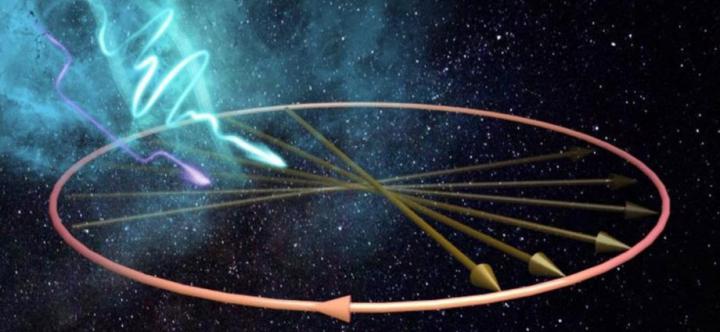Between relativistic and classical wave regimes, newly discovered memory effect alters the Doppler wave signature

Credit: Kozlov et al.
Wave scattering appears practically everywhere in everyday life–from conversations across rooms, to ocean waves breaking on a shore, from colorful sunsets, to radar waves reflecting from aircraft. Scattering phenomena also appear in realms as diverse as quantum mechanics and gravitation. According to Pavel Ginzburg, professor at Tel Aviv University’s School of Electrical Engineering, these phenomena become especially interesting when the waves in question encounter a moving object.
The everyday Doppler effect is familiar–witnessed as the audible shift in pitch that occurs, for example, as a fire engine’s siren approaches, passes, and recedes. The idea that the observed frequency of a wave depends on the relative speed of the source and the observer, a popularized aspect of Einstein’s theory of relativity, entails cosmic implications for the Doppler effect, particularly for light waves. Now, it appears that between relativity and the classical (stationary) wave regime, there exists another regime of wave phenomena, where memory influences the scattering process.
Memory effect alters the Doppler wave signature
As recently demonstrated by a team of scientists led by Ginzburg, including lead author Vitali Kozlov and coauthors Sergey Kosulnikov and Dmytro Vovchuk, the Doppler effect can be dramatically altered by memories of prior wave interactions. Specifically, when rotating dipoles are arranged to retain a long memory of past interactions with an incident wave, the Doppler signature displays asymmetric peaks in the scattered spectrum. Rather than fading quickly, these long-lasting past interactions affect the present and future evolution of the system under study.
“The newly discovered memory effect is universal,” observes Ginzburg, “It can emerge in a variety of wave-related scenarios–from optics, where lasers are rotating molecules, to astronomy, where rotating dipoles can approximate neutron stars.” Although the effect is universal, Ginzburg notes that not every scatterer possesses a long memory. “The effect is introduced on purpose, for instance with lumped circuitry in the case of electromagnetic applications,” explains Ginzburg. He speculates that the memory effect may contribute to increased efficiency of radar target identification and classification, among other applications, such as stellar radiometry.
Ginzburg’s team set out to answer the question of whether there is “an overlooked interaction regime, which on the one hand does not require relativistic velocities yet on the other hand cannot be straightforwardly explained with classical stationary physics.” The team chose a simple case of a rotating dipole as a mathematical model that is “capable of describing properties of many real objects, such as quasars in astronomy or rotating blades of a helicopter in radar applications,” according to Ginzburg.
The researchers hope that these newly demonstrated memory effects will be used to advance our understanding of the universe around us and help give rise to new technological applications that take advantage of long-memory materials to imprint motion signatures on scattered waves.
###
Read the original open access article: V. Kozlov et al., “Memory effects in scattering from accelerating bodies,” Adv. Photon. 2(5), 056003, doi: 10.1117/1.AP.2.5.056003.
Media Contact
Daneet Steffens
[email protected]
Original Source
https:/
Related Journal Article
http://dx.




